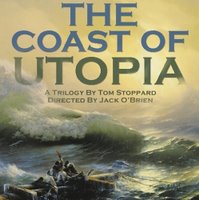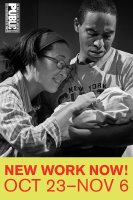The Coast of Utopia - Part 1 - Voyage
 Well I've been looking forward to The Coast of Utopia since I started to hear rumblings of its coming to Lincoln Center during this time last year. The show opened in London in 2002 and I know a whole host of people who must be so excited it's finally here. (Probably the same people who can't wait until 2008 for Billy Elliott) I tell you, after seeing Voyage, part 1 of the three-part series, I was not disappointed! Tom Stoppard has embarked upon a momentous story - and it comes through so very well on stage.
Well I've been looking forward to The Coast of Utopia since I started to hear rumblings of its coming to Lincoln Center during this time last year. The show opened in London in 2002 and I know a whole host of people who must be so excited it's finally here. (Probably the same people who can't wait until 2008 for Billy Elliott) I tell you, after seeing Voyage, part 1 of the three-part series, I was not disappointed! Tom Stoppard has embarked upon a momentous story - and it comes through so very well on stage.The buzz about the show is about how big of an undertaking it is. This triology will be performed at Lincoln Center over the next six months and will feature 44 actors, playing 70 roles, and covering three decades of Russian life, history, art, culture, and ideals. The cast includes such great names as Billy Crudup (Pillowman, anyone?), Richard Easton, Jennifer Ehle (A&E's Pride and Prejudice), Josh Hamilton, David Harbour (Who's Afraid of VA Woolf?), Jason Butler Harner, Ethan Hawke, Amy Irving, Brían F. O’Byrne, and Martha Plimpton. There are even "marathon" performances in which the actors perform all three parts in one day - 9 hours of theatre! I must say I was a little intimidated - but I think it could be an exhilerating experience.
It's such a hard story to explain in terms of plot (all of those Russian names), so I think I'll borrow from the website a bit: "The first part of the trilogy, Voyage, is Stoppard’s nod to Chekhov set at the grand Russian countryside estate of the Bakunin family. Four eligible sisters are under the sway of their charismatic brother, Michael (Hawke), who interferes in their lives, while fervently seeking a greater purpose in his own. As his political and philosophical journey unfolds, Bakunin’s compatriots will include Vissarion Belinsky (Crudup), George Herwegh, Karl Marx, Nicholas Ogarev, Nicholas Stankevich, Ivan Turgenev and, of particular note, the visionary leader Alexander Herzen (O'Byrne)." So as you can see, Voyage is mostly about Michael's journey and largely focuses around his family and their estate. It's invigorating to listen to the dialogue about Russian idealism and literature as it's battered back and forth between the actors. For the three hours I sat watching the show - I was literally enthralled by what I was seeing. I immediately bought the Lincoln Center Theater Review and can't get enough of the information I found inside.
Now all I can say is....the second part, Shipwreck, can't come soon enough....Stay tuned!
Recently an interesting article came out in NY Magazine about the show. Check this out: http://www.newyorkmetro.com/arts/theater/features/23475/

